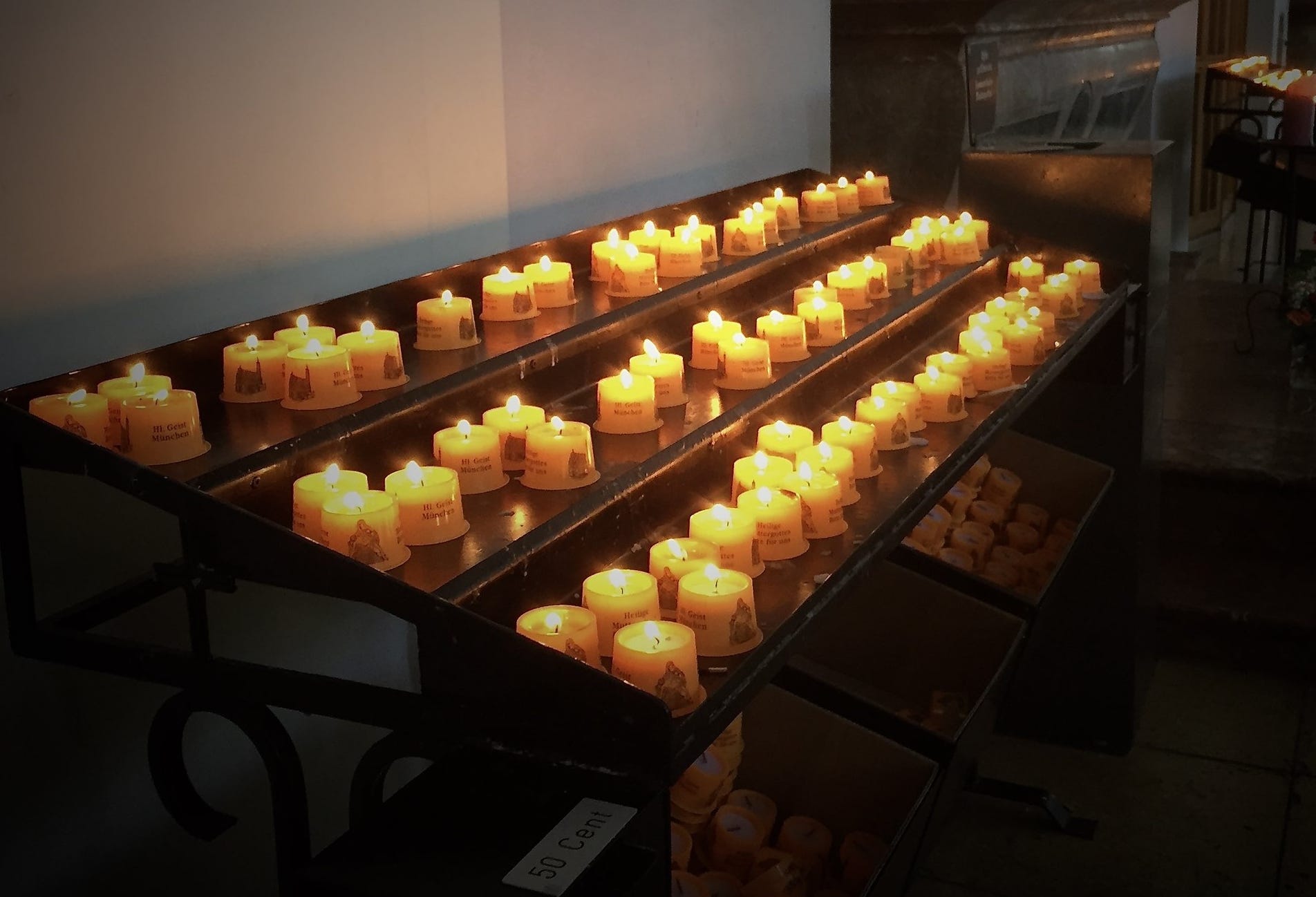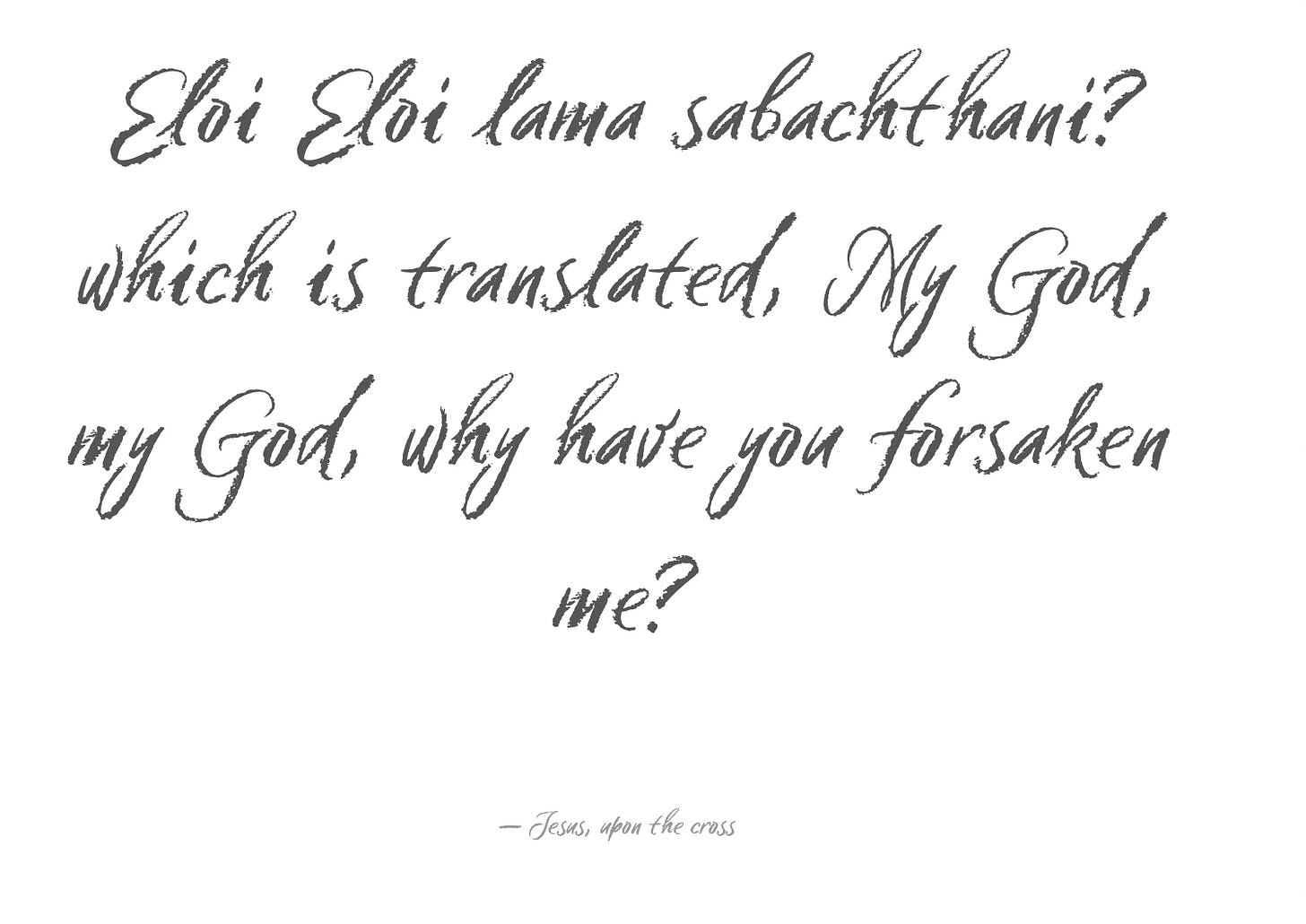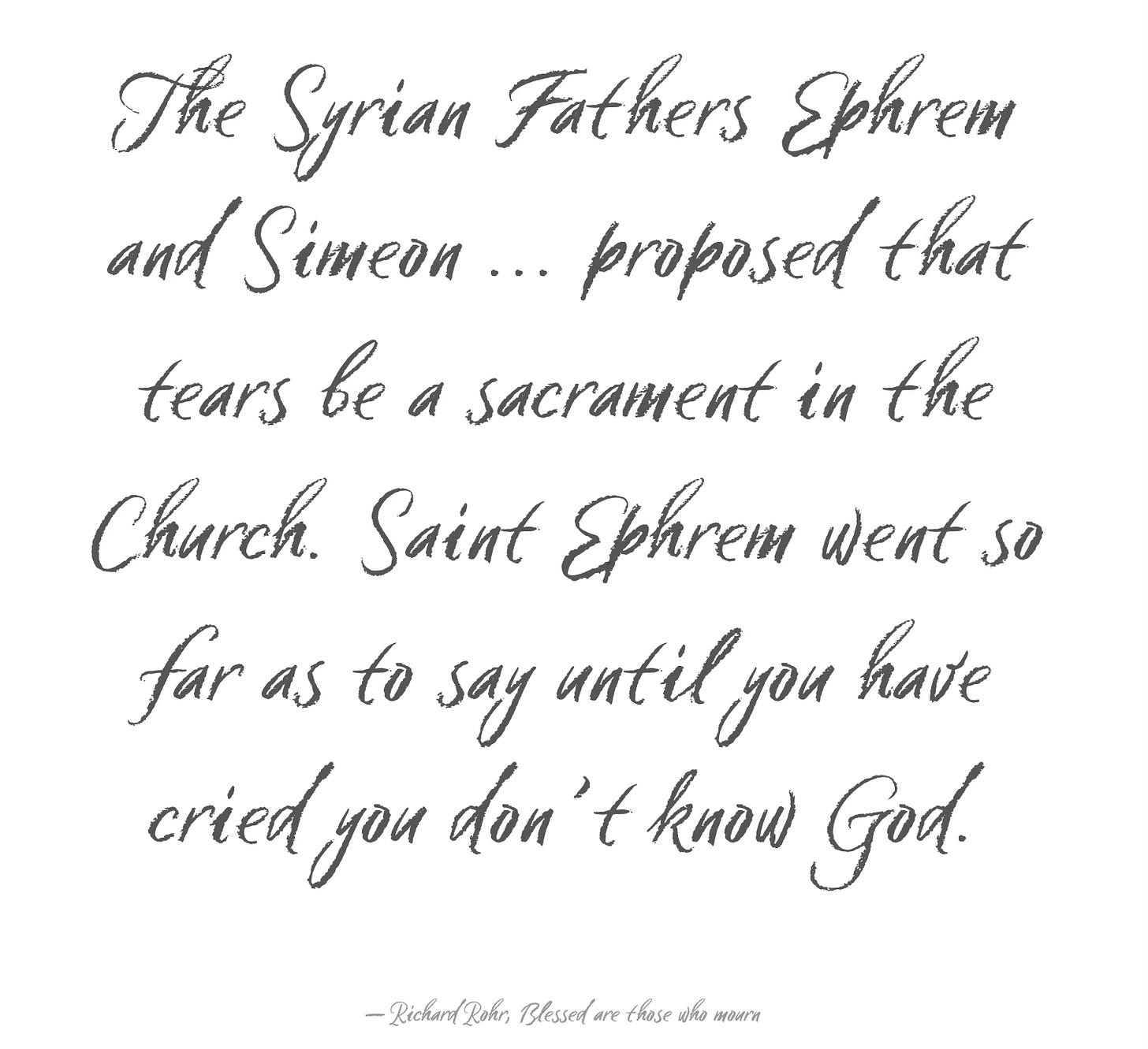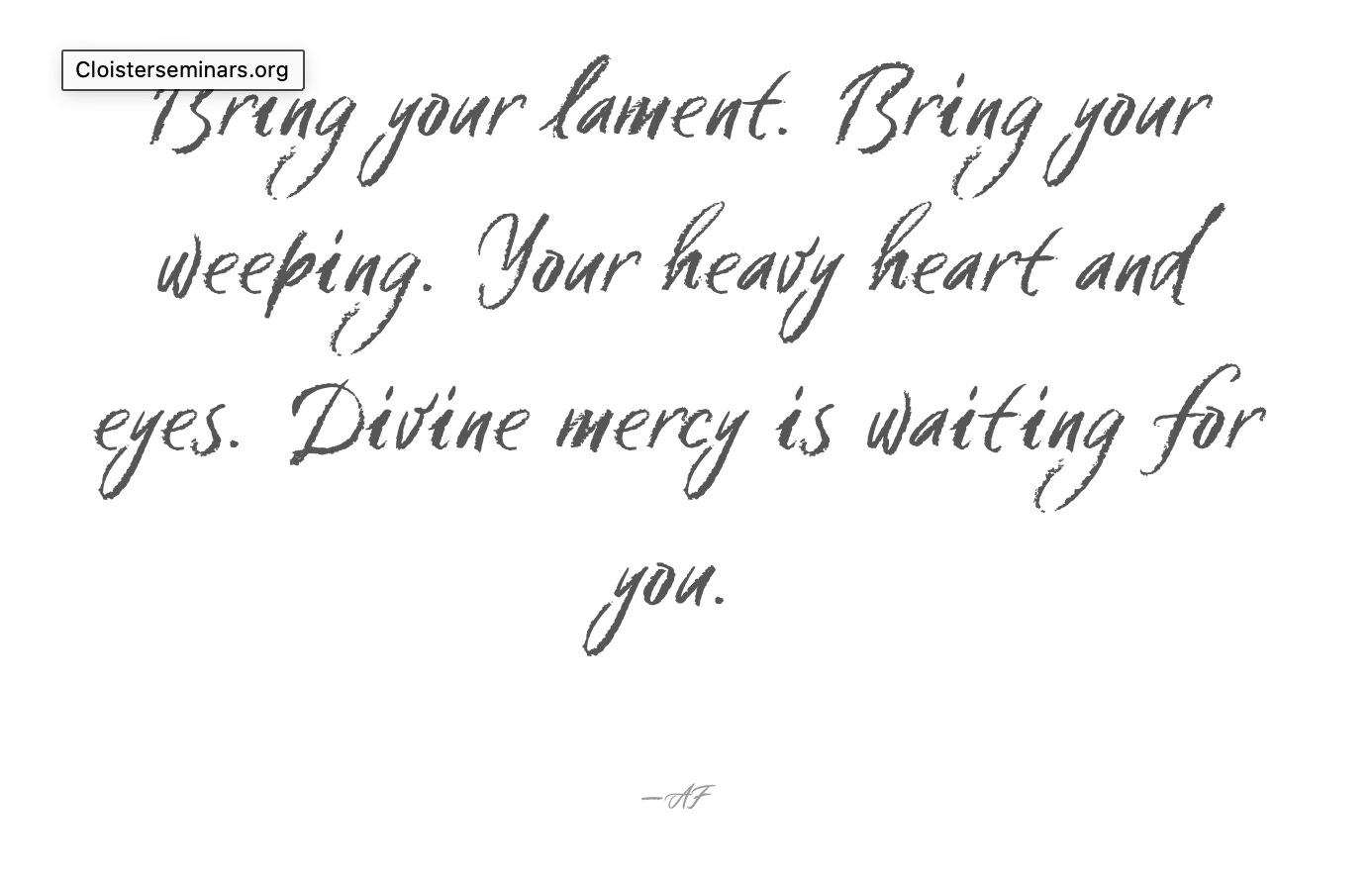What to do with Passion Week? Join us for a week of lamentation.
Mourning might not be fancy. Still, Holy Week invites us precisely into mourning our sorrows and the sorrows of this world - even our feelings of god-forsakenness.
Dear friend,
Many of you might know by now that we are not very churchy people (in the sense of being preachy). But our interest in monastic spirituality has brought us to participate in the liturgy of the Christian tradition more closely again. During our younger years, we were interested in many things other than the liturgy of the church year. Perhaps this was a good thing. As old Søren Kierkegaard used to say: you first have to reflect yourself out of Christianity in order to come back to it renewed.
Some years ago I rediscovered CG JUNG. Jung, the Swiss pastor’s son and psychiatrist has tried his whole life to make psychological sense out of the religion he inherited from his parents. He suggests, that the church year has much to offer for our personal formation. It is like a rich system of rites and symbols with healing powers, a school to learn the art of living. And that it taps the same depths of our soul as do dreams.
What then shall we do with this strange time of the church year, this week which spans between Palm Sunday and Easter? Which comes upon us so quickly that we barely have time to wrap up the Christmas lights we had just recently thrown over the trees in the back yard? I have come to understand passion week as a week for spiritual practice. A practice of tending to our sorrows and to the sorrows of this world. To enter into a time of lament which reminds us that renewal goes hand in hand with grieving what was lost and what we need to let go.
This Lenten season we have pondered both the process of shedding our outer layers (as MEISTER ECKHART teaches in the path towards the inner person) and the brokenness which our hearts endure across a life time.
Our Passion Week Consolations, offered daily starting this Sunday to Easter Sunday, invite you to such a process of “innering” and deepening to find new life within (these Consolations will be send to our paid subscribers - you can subscribe or upgrade your subscription here)
Tending our sorrows: Join our Passion Week Consolations 2024 (March 24-31).
The power of communal Lament
I remember the Passion week we spent in Munich, in Catholic Bavaria. The Viktualien-Markt there is a significant tourist draw, partly because all the locals shop and sell there, too. Plants, baskets, potatoes, cheese, wine, beer, meats, bread, fruit, vegetables, honey, spices, seafood, are all on display interspersed with boutique restaurants and a beer garden. In the time before Easter Sunday you may imagine how busy it was. While enjoying the bustle downtown, we happened to step into a neighboring church on the Saturday before Easter. Despite the many people in the church, quiet enveloped us. Worshipers sat silently, or kneeled quietly in the back of the church, circled around a stature of the corpse of Jesus, laid on a death bed as though he had just been taken down from the cross.
Many thoughts came over me, judgmental thoughts. What are they doing? What is this odd ritual? Isn’t this a bit too literally taken? Kneeling in front of a wooden, richly painted, Jesus-corpse? Doesn’t this feel too macabre? But the reverence of the place made me sit down.
Watching these people kneeling in deep reverence in front of the dead Jesus. Some, seemed to be in deep grief. It did not take long until I understood the profound effect this tradition had on the psyche of its followers. These people really grieved. They really suffered, they really mourned. And they do so every year, in this season. They practiced learning to cope with what we would rather suppress into the unconscious: the suffering, the dying, the loss, the dark night of the soul, when even Jesus felt God-forsaken:
Lamentation as existential Deepening, or God-forsakenness as starting point
Most of my clients are not very religious in the sense of practicing a faith life. Some are quite opposed to anything religious. And still: they know very well how it feels to be God forsaken.
Do you?
Here is where negative theology starts. It begins with the real experience of lack, of indeed feeling God forsaken, hopeless, in despair. And who cannot connect to this feeling at least a little in the face of this pained world? It is the lack of God, of hope, of Divine love in our lives and in our world which is the starting point for our questions, for our pilgrimages and for our search for the deeper life and Divine enlightenment. There must be something more! A place our soul can find rest.
Feeling God forsaken is a dialectical situation, as the Danish theologian Kierkegaard would say. It feels like the end of the world to us, it is indeed inward dying, and still, it strains toward God in a more profound way than our intellectual mind ever could.
Thus, the people in that dark church sitting or kneeling in front of the dead God incarnate taught me an important lesson. Do not take the piety of people lightly. Sit with them in openness, and then understand. Soon I was overcome by the grief and mourning. I wept with them and I prayed with them and I stood in silence with them. And I left the church renewed, with a deeper understanding of Black Saturday.
And now for us, this passion season. After these tumultuous years, where viruses and hatred and war and lies run rampant, we are called into a time of reflection, a week of mourning, of translating the passion into our own lives' context.
Being called to mourning is an existential task. No religion can do it for us. It cannot be mere theater. We cannot be mere spectators. Religion can help to remind us of the need for mourning, can provide an occasion, an invitation for it. There is no resurrection, no new beginning without the deep mourning of the old, without letting go what we loved so dearly, without mourning our losses.
Mourning through the Christian Passion liturgy can become a bridge to our own mourning without the painful opening of deep personal wounds. And I am sure many of those wounds can be healed by such Stellvertreter (surrogate) mourning. Christ as Stellvertreter, literally from German: the one who stands in. Not only as a vessel for the projection of our all pain, all our losses, all our guilt, but also as the hope that transcends all sufferings.
In Jungian practice one is encouraged to practice active imagination. It is a powerful tool to truly enter into dialogue with our own inner movements, e.g. with all that comes to the forefront while reading the reflections above. It may be resistance, or perhaps pain, or tears, or confused non-understanding. The advice is to walk with what ever comes up for a bit and to be open to the unfolding of what lies beneath. Not in order to get lost in the feelings but to have a conversation with them, to see and to welcome them. It is in many ways what monastic practices across many religions have offered us across the centuries.
Surely JS BACH has been one of the greatest facilitators of such an inner movement of lament while being held in Divine embrace. At the onset of the pandemic we started our Passion Week Consolations, using the sublime music of JS Bach’s Passion to heal our weary souls. And since then we have been walking this walk every year. It is a self-paced journey where you will receive a daily consolation and a piece from Bach’s Passion to listen to and to meditate on.
So join us if you can for our daily Passion Week Consolations starting this Sunday, for some tender guidance to hold your sorrows and the sorrows of this world, soothed by the ethereal music of JS Bach’s Passion.
You can still enroll for this journey to receive your daily consolations in your inbox by becoming a paid subscriber (or upgrading your subscription) here. And - you do not need to be a Bach fan for doing so !
What is left for me to say? Perhaps that walking through our passion journey can probably not be done without shedding some tears. But, you should know that such tears will turn into the melting water which brings Spring and new beginnings. It is already arriving.
Looking forward to journey with you through this sacred time, Almut with Chuck and little one
PS: If you can, leave a heart, a word or a line which resonated with you in the comments, so we know you have been here :-)
About Almut
Almut Furchert, Dr. phil., Dipl. Psych. is a German American scholar and practitioner, a psychologist turned philosopher turned writer, traveler, photographer, retreat leader and mother of a pre-schooler. She has taught and published on authors like Kierkegaard, Buber, Frankl, Yalom, Edith Stein, and Hildegard of Bingen. Almut is also a Benedictine Oblate and lives with her family in a little college town in MN.
Thank you for reading, sharing and supporting Cloister Notes, a letter for dancing monks, weary pilgrims and wounded healers in the intersection of psychology, philosophy and spirituality. If you have been moved by my writing please consider becoming a sustaining member to make this labor of love possible and keep it accessible to all. Thank you, thank you.
Subscribed
Tending our sorrows: Join our Passion Week Consolations 2024 (March 24-31).
If you have been on the edge of becoming a sustaining member of our Cloister Notes, this might be the nudge you have been looking for. And if it would help, here is a link which gives you 15% off when you subscribe in the next three days :-)
(If you cannot become a paid subscriber just yet or if you are a member of a religious order or if you would like to send a check instead just respond to this email so I can get in touch and comp you in!)
Praise for Passion Week Consolations
“I have been taking this journey with you and have loved it all. But today was even more meaningful. The practice of listening to a piece I thought I knew so well broke open my heart even more, and I thought it was pretty open. Thank you. Especially love this: "Loss and new beginnings are of the same journey. We are on our pilgrimage towards Easter. Through the tomb," as I sit and listen to people all week who are struggling with this Holy Week and their observance of it. Yours is an entering into, which is the best way altogether.”
—— Mary Taylor, spiritual director and participants of PWC since 2020
Some more about Bach’s Passion
Here is a lovely documentary of how performing the Bach Passion brings together people and groups from diverse backgrounds who have had no experience with Bach before. An eye opening and beautiful 10 min documentary for all who long for a sense of communion in these days. Below is a lovely trailer to the same project, just 2 min. But it gives a good sense of the Bach Passion and how it can be performed in a community setting.
…
In 2016 English Touring Opera teamed up with 30 choirs around the country to perform Bach's St John Passion.
This is the official video trailer for the SACD recording of Bach's St John Passion (in English) with the Crouch End Festival Chorus and Bach Camerata…











Almut, I stumbled upon your Substack a few days ago and have this desire to go back and read everything you have written! It's as if you've heard my seeking self crying out, "Help me reconcile all the dissonant pieces." Your words reach into my soul and help me grapple with feelings and observations that you express...however you do so with such elegance, depth and wisdom...I am thankful for your ability to express in words the ponderings of my heart. Blessings.
"...until you have cried you don't know God." This reminded me of my very tender heart when I began attending church for the first time in my life at twenty-four years old. I had just lost my brother to suicide and I was broken through and through. I love thinking about that time of openness in my life. Now my weeping is for what has happened to the church in America. I'm not a part of it any longer. But your post reminded me that there is that within me that is soft and open and needs to weep again.